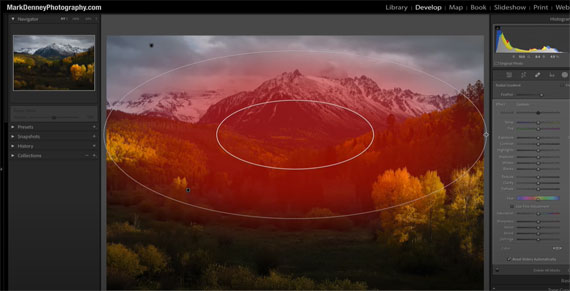In this video, Mark Denney discusses the use of vignetting in photography and a technique called “reverse vignetting.” Vignetting is a common technique in which the corners of an image are darkened to draw the viewer’s eye towards the center of the image. However, this technique may not work as effectively on symmetrical images or images where the area of interest is not in the center of the frame.
In these cases, Mark recommends using a “reverse vignette” technique. This involves using the radio filter in Lightroom to apply a brightening effect to the corners of the image, rather than a darkening effect. This can help to draw the viewer’s eye towards the center of the image and create a sense of balance within the frame.
Mark Denney discusses using two tools in Adobe Lightroom: the vignette slider and the radio filter. The vignette slider is a built-in tool in Lightroom’s “Effects” panel that allows users to apply a darkening effect to the corners of an image. The radio filter is also located in the “Effects” panel and allows users to create a custom vignette by drawing a circular or elliptical mask on the image. The area inside the mask is either darkened or brightened, depending on the settings chosen by the user.
Mark demonstrates how to use both of these tools to create traditional and reverse vignettes, and recommends experimenting with both to determine which works best for a given photograph. He also suggests adjusting the strength of the vignette to suit the needs of the image and considering the overall composition and visual hierarchy within the frame.
Mark notes that this technique may not work for every image and suggests experimenting with both traditional and reverse vignetting to determine which works best for a given photograph. He also recommends adjusting the strength of the vignette to suit the needs of the image, as well as considering the overall composition and visual hierarchy within the frame.
Like This Article?
Don't Miss The Next One!
Join over 100,000 photographers of all experience levels who receive our free photography tips and articles to stay current:






